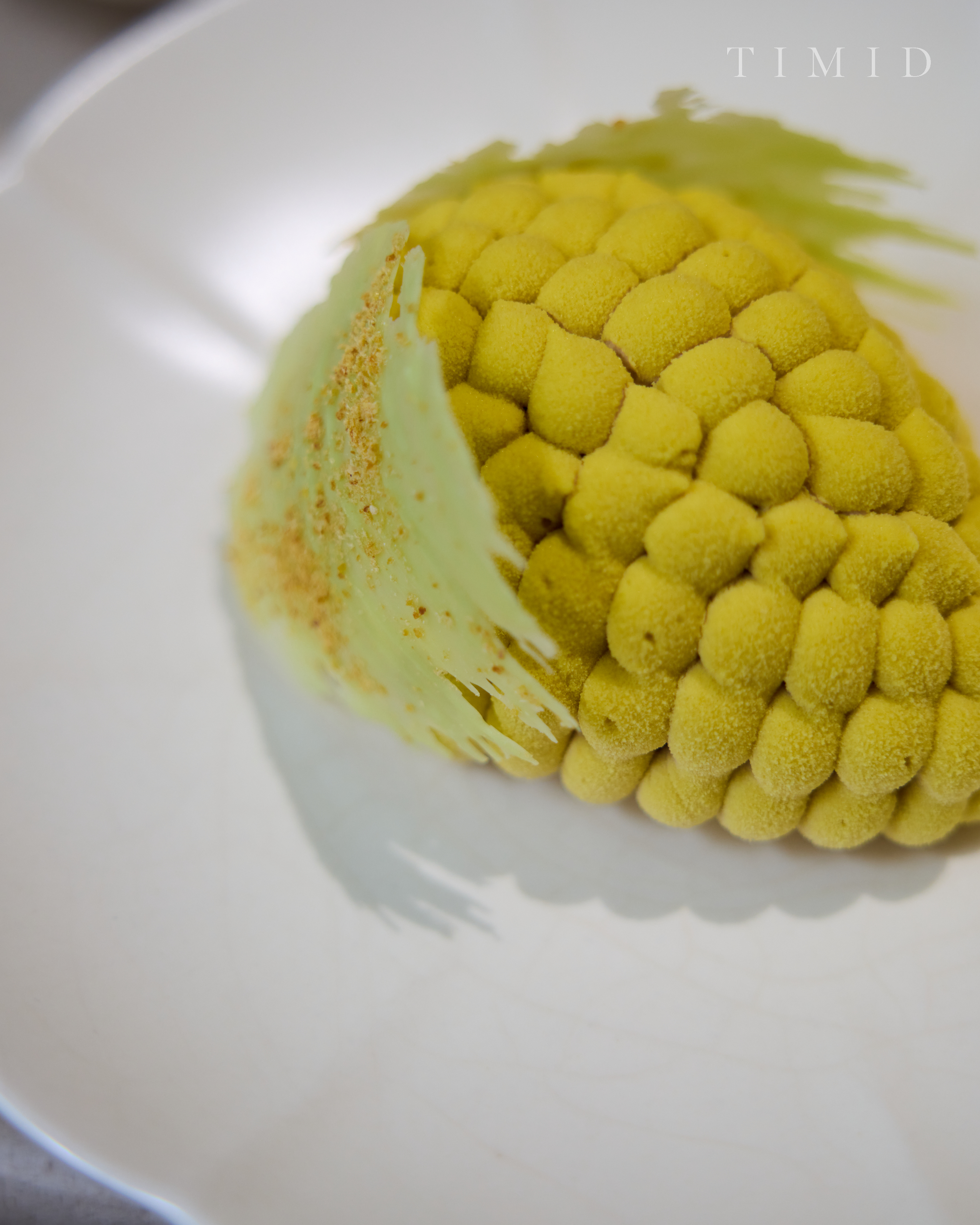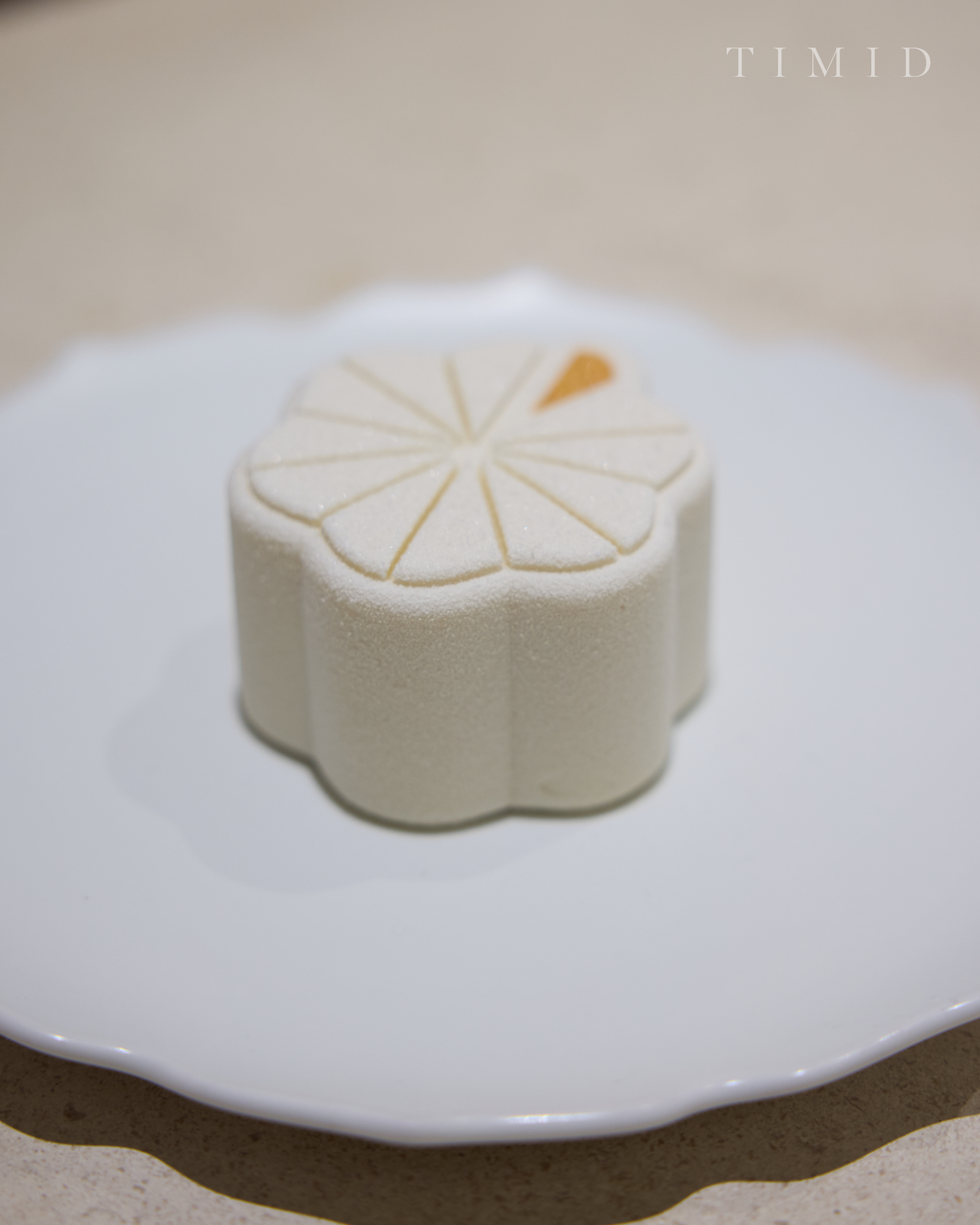

When asked which dessert describes her best, Eunji Lee didn’t hesitate to say her signature dish, Lysée. Not only is it her restaurant’s namesake, but it’s also an edible memoir of her flavorful journey. Composed of Korean brown rice mousse, pecan praline, and a hint of cookie dough, the sweet is a bite-sized expression of her identity and style: Korean heritage, French technique, and New Yorker sensibility.
For Lee, her pastries are more like a conversation between ingredients and fine art. Listening to her describe her process is reminiscent of an artist discussing their medium; each dessert is approached with deliberate precision, sculpted for the perfect texture and visual aesthetic before a single bite is even taken.
At Lysée, Lee isn’t just serving dessert. Instead, her pastries are like artworks in a gallery. They are an expression of who she is.
Eunji Lee: I was born in Korea. When I was young, I wanted to be a pastry chef. So at 18 years old, after high school, I moved to France to learn in a baking and pastry program. Then, I spent 11 years in France. I studied at a baking school, I did internships, and I worked in a restaurant for three years, then four years at the Le Meurice.
In 2016, I got an offer from Jungsik restaurant [in New York] to be the Executive Pastry Chef. I accepted it, and I moved to New York, where I lived for five years. In 2021, I left Jungsik. For about a year and a half, I prepared my own space to open Lysée.
As for the name behind the restaurant, Lysée is two words combined: Lee from my last name, “musée,” meaning museum in French.


EL: I love art, and I love pastry. When I was young, my parents really loved art, so they always brought me to galleries and museums. I also have a lot of baby photos where I'm drawing on canvases; really, I was a kid who loved to create something with my hands.
One day, randomly, I saw a pastry chef’s life. I saw that they were creating beautifully designed cakes, and people [looked] so happy when they ate them. I didn't even know that job [existed] before, but when I saw it, I just decided that it was my dream job.
To me, pastry is edible art, and pastry chefs [create] those edible arts. When you go to a gallery, you can see beautiful art. You have the emotion, but you cannot eat [it], obviously. But [with] pastry, that's when you [can]. You can make people happy visually and also find a taste. That's what I love so much about this job.
EL: I think sometimes it's very instant, like “oh, I want to do this,” and then I test it. It varies depending on what I want. For example, the corn. I wanted to make a corn dessert, and when I opened Lysée, I really wanted to use corn as our main ingredient because [it’s] one of my favorite ingredients.
Also, I made [the corn] back in 2017 when I participated in a competition, kind of like a “Top Chefs” pastry competition in France. I showed the corn dessert there, and the chefs really loved it. So I wanted to use that. I [had] all the components in order, but it can be boring to me. I was thinking a lot, “how can I impress people?” How can [it] stay in their mind so that they can remember the corn dessert? I tried some other shapes, but [in] the end I said, let's make a corn protein dessert. So it came up.
EL: I think I obviously like the signature dessert. That's why it’s our signature, because it's my identity, the concept of what I'm doing, and my style. It’s French-Korean-New Yorker: Korean heritage, French technique, and New Yorker-adapted native flavors and ingredients.
It's made with the Korean brown rice mousse, but with a French technique, like [how] to make the mousse and how to build the shape. There’s pecan from a local farm, [and] I don't think the menu describes [it], but there is cookie dough as well because I love cookie dough. [It’s] my culture all mingled, from the ingredients to my [ideas].

EL: It's been almost twenty years of experience for me now, and a lot of [the people] on my team [are] chefs who just started. I'm telling them, the most important [thing] is [your] attitude. We're making pretty, beautiful things, but behind that, it's hard to stay the whole day in the kitchen; it can be physically or mentally hard. But if you have a strong passion, if you have [pride] and love for what you're doing, you don't give up. You won’t give up.
EL: We just started our brunch [at the time of this interview], only for the weekend. We're doing a more savory menu, a more brunch-style menu. I'm having fun with that. We'd like to develop our brunch menu more, and there are a lot of products coming up.
We launched a wine program [previously], so we have wine pairings with dessert, and we launched cocktails as well. It's really exciting, but we still have some collaboration pop-ups, too.
At the same time, we launched ice cream. I really liked the wine and dessert, and I wanted to make more savory [dishes] because it's fun. I still have a lot of ideas for what I want to do here; I want to develop more in the U.S.
Disclaimer: This interview has been edited for length and clarity.

